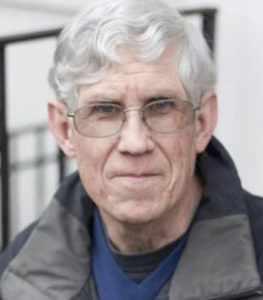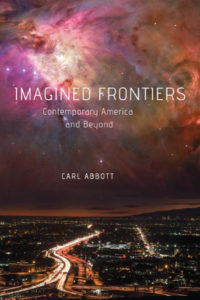Book review – Imagined Frontiers
‘Imagined Frontiers’ is a book about the impact lines on maps have had on American art and culture.
In it, urban historian Carl Abbott notes that because “they mark difference, they are also edgy places where change can happen—like the spark that rebalances electrical potential.”
 The book looks at the work of American artists who have used novels, film, television, maps, and even performance art to explore these frontiers – the metropolitan frontier of suburban development, the classic continental frontier of American settlement, and the as yet unrealized frontiers beyond Earth.
The book looks at the work of American artists who have used novels, film, television, maps, and even performance art to explore these frontiers – the metropolitan frontier of suburban development, the classic continental frontier of American settlement, and the as yet unrealized frontiers beyond Earth.
Whether knowingly or not, Abbott has also constructed a polemic on how Donald Trump has used the buttoned down kind of suburbanism ingrained in the American character to ‘spark’ division and carve out a political career.
Indeed, the words ‘imagined frontiers’ could be used to describe the president’s divisive political shtick.
The wall that the president promised to build along the US’ border with Mexico was always more about creating divisive lines than controlling immigration. In fact, not a brick has been laid in a new wall.
During his election campaign, Trump’s rhetoric around ‘rapists’ and ‘drug gangs’ in reference to Latin American migrants delineated just who he and his supporters were explicitly against.
In 2018 President Trump he ramped up the same political frontier by demonising columns of Central American asylum-seekers fleeing gang violence, persecution and abject poverty and seeking a chance at a new life in the US.
 Now, trailing in the polling for the next presidential election, he has sent federal armed officers on to the streets of US cities, including Dr Abbott’s home town of Portland Oregon, to take on Black Lives Matter protesters while saying that he is a president for law and order.
Now, trailing in the polling for the next presidential election, he has sent federal armed officers on to the streets of US cities, including Dr Abbott’s home town of Portland Oregon, to take on Black Lives Matter protesters while saying that he is a president for law and order.
Another move saw him deploy armed immigration officers to engage non-existent Mexican gangsters on the southern border.
Implicit in all of this is a message that: ‘America’s frontiers have already been breached and the enemies are already among us’.
Also, Trump seems to have successfully politicised the Department of Homeland Security (DHS).
DHS officers have broken up migrant families, increased the arrests of long-standing undocumented migrants and intimidated lawful protesters seemingly in a bid to score electoral points for the president.
The organisation’s founding secretary, Pennsylvania’s former Republican governor Tom Ridge has recently warned the mission of the DHS was not “to be the president’s personal militia”.
But Trump may have miscalculated in pandering to his conservative base.
The protesting crowds in Portland are largely peaceful and contained to a few city blocks. Recently, the protests have included yellow t-shirt wearing ‘moms’ – mostly first-time activists, who say their mission is to protect the protesters from heavy handed law enforcement.
Trump has given conservative outlets a distraction from the COVID-19 crisis and cosied up to his base. But most Americans support the protests and most consider him responsible for the chaotic state of the nation.
Maybe the frontier Trump has created is setting his minority of Americans against the majority.
November’s presidential election will show where that frontier really lies.
Imagined Frontiers, by Carl Abbott, University of Oklahoma Press, $33.75












